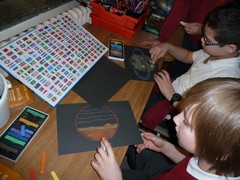Last week, between 4-8 March 2012, EU-UNAWE joined hundreds of European scientists, educators and other research and industry representatives at the EU Science: Global Challenges and Global Collaboration conference at the European Parliament in Brussels, Belgium. The main focus of the conference was to encourage worldwide collaborations to maximise the impact of Horizon 2020 by promoting global collaborations to generate effective scientific responses to various global challenges.
Members of EU-UNAWE took part in the 'Science for Global Development: Astronomy – A Case Study' workshop on the third day of the conference (6 March). The workshop offered an opportunity for participants to discuss how astronomy can be effectively utilised as a development aid and as a tool for human and technological capacity building and how it can help to fulfil the goals laid out by Horizon 2020, focusing specifically on the role of research, universities and schools.
Participants in the workshop concluded unanimously that astronomy is an outstanding tool for furthering sustainable international development around the globe. Astronomy can be effective in stimulating technological capacity building. It has driven the development of several new cutting-edge technologies that are now being used in everyday life, such as wireless Internet, GPS navigation and medical X-ray imaging.
Astronomy is also a particularly important tool in stimulating human capacity building and education at all levels. It has led many to choose a career in science and engineering. As a programme that aspires to motivate very young children with the grandeur of the Universe, it was concluded during the workshop that supporting Universe Awareness (and other such astronomy-driven capacity building programmes) is extremely cost-effective and can provide many benefits to society for a relatively small fraction of the expenditure on astronomical and space research.
The strategic plan of International Astronomical Union (IAU) received considerable attention during the workshop. This plan addresses all aspects of Astronomy for Development and is promoting activities to support primary, secondary and tertiary education, as well as building research capacity in science, and stimulate a public understanding and awareness of science. UNAWE is a crucial component of the IAU plan.
According to George Miley, architect of the IAU plan: “The workshop was a great success. The message of the participants to the European Commission is that the astronomy can make a vital contribution to furthering sustainable development, an important global societal challenge. However, Astronomy for Development is a topic that transcends several EU directorates. I encourage the Commission to help facilitate support for such inter-directorate projects”.
A list of all this year's Science Education Conferences can be found here.













